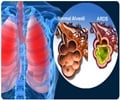Diversity of the microbiome, especially fungi, may play an essential role in understanding why some COVID-19 patients develop acute respiratory distress syndrome (ARDS) and some do not, reports a new study.

‘Less diversity in the microbiome is associated with worse outcomes for patients with acute respiratory distress syndrome.’





The human microbiome is made up of tiny organisms such as bacteria, viruses, and fungi. Presenting her research to the meeting, Ms. Noel Britton, a Ph.D. candidate at the University of Pittsburgh, USA, said that up to now researchers had tended to concentrate on studying the effects of bacteria on human health, partly because the microbiome is primarily composed of bacteria and there are technical difficulties in extracting enough fungi to study."In terms of numbers of cells, fungi are outnumbered by bacteria by several orders of magnitude," she said. "Additionally, while it is now well established that the lungs play host to a distinct and dynamic microbiome, they don't represent a rich environment for microbes to thrive, and they generally have many fewer microbes than the gut--the body site where scientists have focused the most microbiome research. It can be difficult to pick up a signal from such a low mass of fungi and to be sure that the sequences identified are not due to contamination in the laboratory.
"We characterized out this research as acute respiratory distress syndrome, is characterised by a hyper-inflammatory over-reaction of the immune system, and we know that fungi can be involved in activating and regulating the human immune system. There are no known therapies for the successful treatment of ARDS and very little is known about why some patients have a hyper-inflammatory response. The diversity of the microbiome, and specifically of fungi, may play an important role in understanding why some patients develop ARDS and some do not."
Ms. Britton and her colleagues enrolled 202 mechanically-ventilated patients in the study between October 2011 and September 2019. As far as they know, none of these patients had COVID-19, but they are continuing to enroll patients through the pandemic, and future analysis will look at those with confirmed COVID-19.
Of the 202 patients in this analysis, 21% had a diagnosis of ARDs, the average age was 50 years old, and 61% were women. The researchers collected mucus-based secretions from the trachea (the main airway leading down to the lungs) and extracted DNA to analyze in the laboratory using a technique called next-generation sequencing.
Advertisement
Fungal diversity was lower in ARDS patients than in those without the disease. In ARDS patients, shock, sepsis, and organ failure were associated with lower diversity. Decreased diversity was linked with worse injury to the lungs, more intensive treatment and elevated levels of a protein called pentraxin-3, which is an indicator of inflammation and disease severity.
Advertisement
It is not known how fungal (or other microorganisms) diversity develops, but fungi are most likely to enter the lungs through inhaling tiny amounts of saliva into the lungs.
"As the human body's second-largest mucosal surface area, roughly the same size as a tennis court, human lungs are constantly exposed to fungi through inhalation," said Ms. Britton. "Airborne fungi are especially prevalent, comprising up to 50,000 spores per cubic metre of air, and so the respiratory tract is exposed to a wide variety. Inhaled fungi can be extremely diverse and include species known to be disease-causing as well as those believed to be harmless in humans."
Tobias Welte, who was not involved in the research, is the European Respiratory Society Past President, Professor of Pulmonary Medicine, and Director of the Department of Pulmonary and Infectious Diseases at Hannover University School of Medicine, Germany. He said: "In the last few years, much attention has focused on the microbiome, particularly in the gut, and its relationship to a variety of health problems. Fungi are harder to study than other components of the lung microbiota, such as bacteria and viruses, but we're starting to see more evidence that they also have a role in chronic lung disease.
"The finding from this study, that less diversity in the mycobiome is linked to worse outcomes for patients with acute respiratory distress syndrome, is fascinating. It's too early to know what this might mean for patients and their doctors, but it has the potential to lead to new diagnostic tests and better treatments."
Source-Eurekalert















